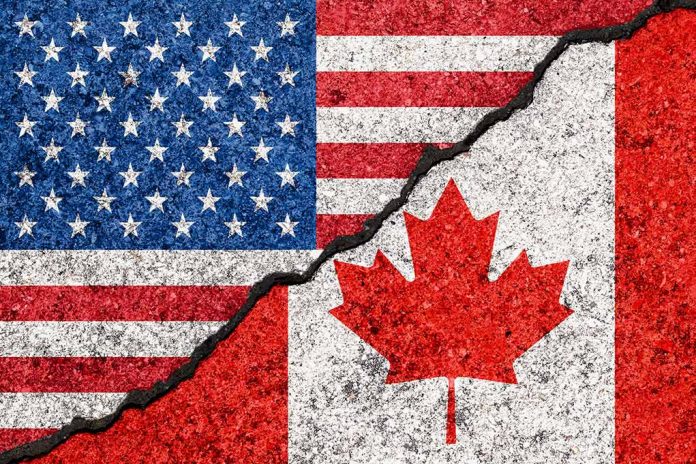
Donald Trump’s decisive economic measures against Canada’s drug smuggling ring through tariffs have sparked heated debate and international tension.
Key Takeaways
- Trump imposed significant tariffs on Canada, Mexico, and China to combat drug smuggling.
- The International Emergency Economic Power Act was cited for the tariffs.
- Canada issued its retaliatory tariffs, criticizing U.S. measures.
- Trump’s approach sought to strengthen national security and international cooperation.
Imposing Tariffs as a Strategy
On February 1, 2025, Trump’s administration levied tariffs as high as 25% on Canadian and Mexican goods and 10% on Canadian energy and Chinese imports. These tariffs aimed to combat the flow of illicit drugs, such as fentanyl, into the United States—a crisis threatening national health and security. The tariffs covered approximately USD 1.4 trillion of imported goods annually, representing a significant economic measure underpinned by the International Emergency Economic Powers Act (IEEPA).
This executive decision tied national security with economic policy, aiming to pressure Canada into bolstering its drug trafficking prevention efforts. The move reflected Trump’s strategic use of tariffs, which he viewed as a persuasive tool for promoting international cooperation against drug trafficking and illegal immigration.
It's easy to see what Trump is doing if you have read his book “The Art of the Deal”. His recent imposition of tariffs on Canadian imports reflects several negotiation strategies from his book.
1. **Use Leverage**: By imposing a 25% tariff on Canadian goods, Trump applies…
— Nadine Ness (@NadineGNess) February 2, 2025
Global Reactions to the Tariffs
Canada and Mexico responded promptly to Trump’s tariffs. Canadian Prime Minister Justin Trudeau introduced retaliatory tariffs on USD 155 billion of U.S. goods, escalating tensions between the two trading partners.
Trudeau criticized the measure, stating, “This is a choice that, yes, will harm Canadians, but beyond that, it will have real consequences for you, the American people.” Trudeau’s remarks emphasized the potential economic fallout and the shared impact on both Canadian and American industries.
The response from Mexico was equally swift and critical. President Claudia Sheinbaum condemned Trump’s narrative that Mexico was allied with criminal groups and announced unspecified retaliatory tariffs. These diplomatic challenges highlighted the complex interplay of national interests and international relations.
Trump imposes 10% tariffs on China – Canada and Mexico hit with 25%
President Donald Trump signed a trio of executive orders on Saturday that imposed 25% tariffs on imports from Canada and Mexico and a 10% duty on imports from China as he sought to force the countries to clamp… pic.twitter.com/l9nQ9i3dKG
— Indo-Pacific News – Geo-Politics & Defense (@IndoPac_Info) February 2, 2025
Legal and Political Implications
Trump’s administration invoked the IEEPA and National Emergencies Act, framing the tariffs within a legal and national security context. The executive order expanded a previously declared national emergency to include threats originating from the northern border, marking a significant move in U.S. foreign policy.
President Trump emphasized that these tariffs are enacted “because of the major threat of illegal aliens and deadly drugs killing our Citizens, including fentanyl.”
The Secretary of Homeland Security was tasked with consulting other officials and monitoring Canada’s adherence to protocol in addressing the drug crisis. With mandated reports to Congress, the order carefully structured government oversight of the international issue without granting enforceable rights against the U.S. government.
![Trump Caught NATO Off Guard Trump JUST Completely U-Turned [Total Game Changer]](https://usnewsbreak.com/wp-content/uploads/sites/13/2026/01/Trump-JUST-Completely-U-Turned-Total-Game-Changer--218x150.jpeg)




